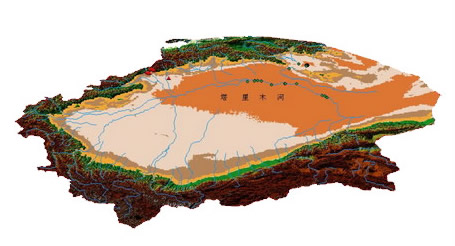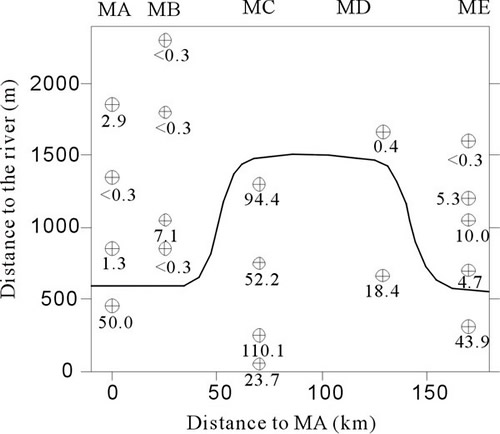Highlight 2009-055Update time:12 28, 2009
Hydrological Processes, 2010, 24: 147-159 Diminished groundwater recharge and circulation relative to degrading riparian vegetation in the middle Tarim River, Xinjiang Uygur, Western China Zhonghe Pang, Tianming Huang, Yaning Chen Abstract
Riparian vegetation in the middle Tarim River is being degenerated, and groundwater in the riparian system is a key factor controlling this process. Vegetation degeneration is related to the reduced inflow from the upstream, reduced recharge to riparian groundwater, lowered water table and increased salinity of the groundwater system. Systematic chemical and isotopic sampling of river water and groundwater transects perpendicular to the river show that riparian groundwater is fed by the river. River water picks up salts from the river bed and/or from irrigation returns as it flows downstream, and groundwater from riverbank sediments mirror this pattern. Mineral dissolution and evapotranspiration are the main mechanisms of salt accumulation in groundwater. Reduced recharge from the river has resulted in a distinctive zoning pattern in groundwater salinity. Groundwater residence times derived from tritium contents indicate that the extent of modern recharge (since the 1960s) is limited to approximately 1500 m from the riverbank in the middle reaches of the Tarim River. Vegetation grows better in habitats with modern groundwater than in other areas. The embankment built in 2001 along one side of the Tarim River appears to have reduced groundwater recharge, causing the water table to drop and ecosystem to degenerate. Copyright © 2009 John Wiley & Sons, Ltd.
|
Contact
Related Articles
Reference
|
-
SIMSSecondary Ion Mass Spectrometer Laboratory
-
MC-ICPMSMultiple-collector ICPMS Laboratory
-
EM & TEMElectron Microprobe and Transmission Electron Microscope Laboratory
-
SISolid Isotope Laboratory
-
StIStable Isotope Laboratory
-
RMPARock-Mineral Preparation and Analysis
-
AAH40Ar/39Ar & (U-Th)/He Laboratory
-
EMLElectron Microscopy Laboratory
-
USCLUranium Series Chronology Laboratory
-
SASeismic Array Laboratory
-
SEELaboratory of Space Environment Exploration Laboratory
-
PGPaleomagnetism and Geochronology Laboratory
-
BioMNSFrance-China Bio-mineralization and Nano-structure Laboratory

 Print
Print Close
Close


